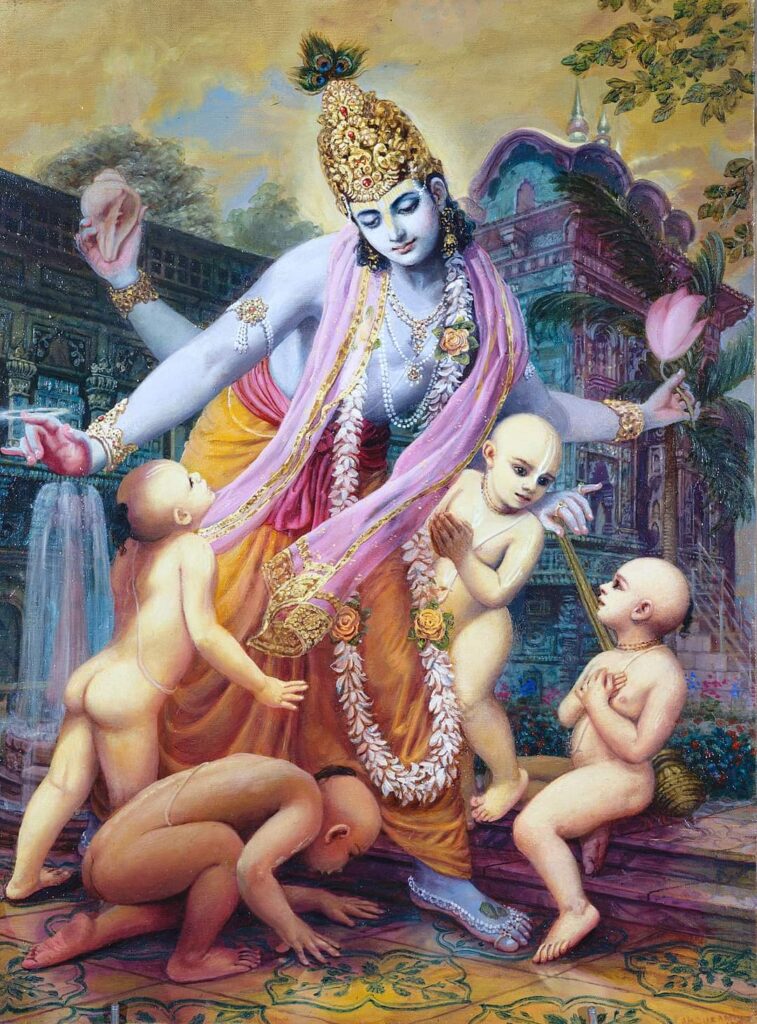At the end of the third canto of Srimad Bhagavatam, Sukadeva Goswami describes four categories of devotional service, according to the teachings of Lord Kapila. We may think that devotional service is always transcendental, but that’s not the case. Although the propensity of serving Krsna is originally present in the soul, as long as we are conditioned it may be expressed in impure ways through the three modes of material nature, just like the light of the sun can become blue or red when passing through colored glasses.
What are the symptoms of devotional service in the mode of ignorance? “Devotional service executed by a person who is envious, proud, violent and angry, and who is a separatist, is considered to be in the mode of darkness.” (SB 3.29.8)
What about devotional service in passion? “The worship of Deities in the temple by a separatist, with a motive for material enjoyment, fame, and opulence, is devotion in the mode of passion.” (SB 3.29.9)
“Separatist” means someone who has different interests from the Lord, someone who is still acting under material desires, false ego and the dictations of the mind. What he wants is different from what the Lord wants, which creates lots of contradictions in his service. Some of his actions may be positive, while others will be very negative.
Finally, there is service in the mode of goodness, which is based on the idea of achieving liberation (not pure, but almost there) and pure devotional service, which “is exhibited when one’s mind is at once attracted to hearing the transcendental name and qualities of the Supreme Personality of Godhead, who is residing in everyone’s heart. Just as the water of the Ganges flows naturally down towards the ocean, such devotional ecstasy, uninterrupted by any material condition, flows towards the Supreme Lord.” (SB 3.29.11-12)

In the 4th canto, Sukadeva Goswami proceeds by giving practical examples of these different qualities of devotional service and what results they award.
The pastime of Daksa cursing Lord Shiva is given as an example of devotional service in the mode of ignorance. Daksa assumed an important post in the universe, becoming responsible for populating the universe as the leader of the prajapatis. This is a very responsible post, higher than the demigods. However, because he was affected by the mode of ignorance, he exhibited envy, pride, and anger towards Lord Shiva, whom he couldn’t properly appreciate. He even disregarded his own daughter, which resulted in her death.
What was the result? Daksa was punished for his offenses. He was first killed, then he received the head of a goat, then he had to practice austerities for a long time to finally receive a new body and be able to regain his service. Daksa then proceeded to offend another pure devotee, Narada Muni. There is no information about when he may go back to Godhead.
Similarly, a devotee performing service in the mode of ignorance is not rejected by Krsna but may have to face adverse results due to his offenses and remain in this material world for a long time.
The pastime of Dhruva Maharaja, the second major pastime of the 4th canto, is given as an example of devotional service practiced under the mode of passion. Dhruva Maharaja was seeking the Lord out of the desire for material benefit, desiring to achieve a kingdom greater than his father. The result was that he gained what he desired, becoming the king of Bhu-Mandala, but on the other hand, had to live for 36,000 before finally going back to Godhead.
Similarly, one may worship Krsna with the desire to achieve some position of prestige, become a religious leader, or some other kind of authority, or even directly receive some material benefit. One may even worship the deity, teach the scriptures, and perform other types of service as a show, with the purpose of attracting the adoration of others. Again Krsna doesn’t reject this devotee, and in fact, he way achieve the material opulence he desires, but he will have to stay in the material world to enjoy it. Only after giving up this propensity may one finally go back to Godhead.
Finally, there is the example of pure devotional service, offered in the story of King Prthu.
Prthu Maharaja is given as the example of the perfect devotee, because he perfectly executed his service of managing the universe without false prestige, rapt in meditation in the forms and qualities of Krsna, and perfectly dovetailed with the desires of the Lord. The result was that he was directly empowered by the Lord to execute his service, gained the association and blessings of pure devotees (the four Kumaras), and was able to easily go back home, back to Godhead.
